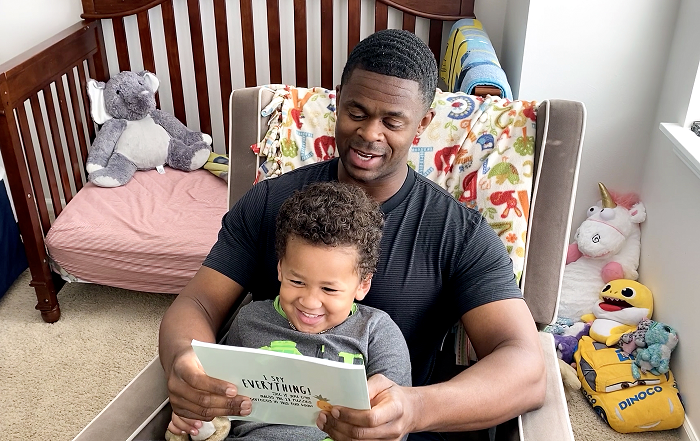 In many ways, my role as a father did not change after my 17-month old son, Isaac, was diagnosed with cancer.
In many ways, my role as a father did not change after my 17-month old son, Isaac, was diagnosed with cancer.
Everyone faces adversity in their lives. Did I think ours would be this? Heck no. Did I want it to be this? This is the last thing I wanted. Take me before you take him, I thought.
But the severity of our situation hasn’t changed the lessons I teach my sons: In situations of extreme stress, maintain your demeanor and learn how to process and handle that stress; Be kind to people in the midst of adversity; Treat people the way you want to be treated; Be respectful.
And, never give up.
The worst-case scenario
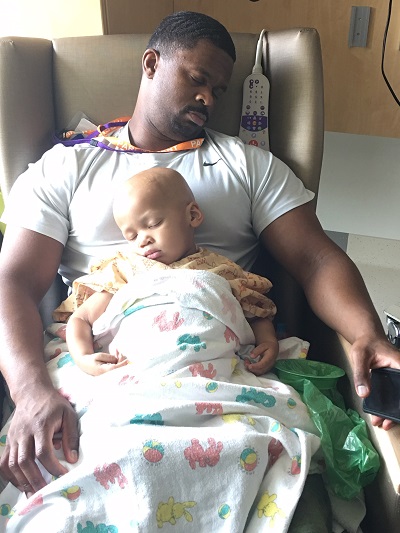 I will never forget the day my son was diagnosed with stage 4 high-risk neuroblastoma.
I will never forget the day my son was diagnosed with stage 4 high-risk neuroblastoma.
He’d been lethargic with high fevers off and on for a month or two. We kept going back to our pediatrician, who told us to give him Tylenol, but the fevers always came back. After six or seven fevers, my wife, Kelli, and I said “You need to do more.” We knew this was not normal — something was wrong with our son.
After running blood tests and listening to Isaac’s abdomen, our pediatrician suggested he might have appendicitis and sent us to Seattle Children’s. Once we got to there, doctors found a large mass — the size of a NERF football — crushing Isaac’s right kidney. Another blood test revealed Isaac had some kind of cancer.
Isaac ended up having high-risk, stage 4 neuroblastoma. It had spread throughout his body — in the bones of his arms and legs and, of course, the big tumor in his abdomen. It was the absolute worst-case scenario.
Isaac had a 50/50 chance of survival — like the flip of a coin.
Kelli broke down when they told us. I’ll never forget hearing my wife screaming, crying. You never expect this to happen to your child.
I tried to remain positive, saying, “The first chapter in his book is just going to make his story that much more epic when he defeats cancer and we are blessed enough to walk out of here.”
A long road ahead
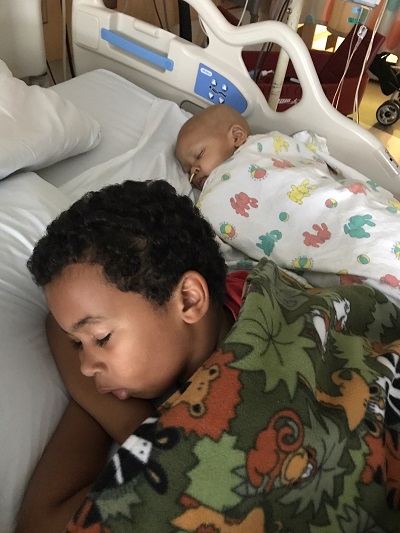 To say we were overwhelmed by the treatment plan laid out for us would be a gross understatement. It had three phases:
To say we were overwhelmed by the treatment plan laid out for us would be a gross understatement. It had three phases:
First: Five rounds of chemotherapy and a dissection surgery to remove the tumor in Isaac’s abdomen.
Second: Intense chemotherapy and radiation conditioning treatment before a stem cell transplant, followed by 12 more rounds of radiation and a second stem cell transplant.
Third: Immunotherapy, in which antibodies designed to help Isaac’s immune system find and destroy neuroblastoma cells were injected into his bloodstream.
All in all, the treatment was expected to take 18 months. I remember thinking, “That is as long as he’s been alive. How are we going to be in this hospital for over a year? Are we supposed to stop working? How can we manage this?”
It felt impossible. But we took it one day at a time. That’s how I coped with it. I didn’t think about what was seven months or eight months out, I just thought, “What’s next?” That was all I need to know.
Managing morale
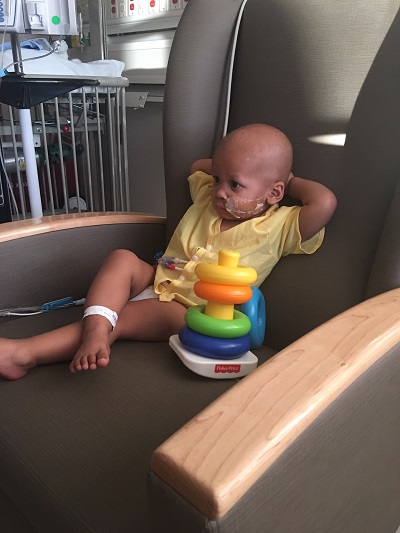 Throughout Isaac’s treatment, my first priority was happiness — making sure that Isaac was happy, laughing and being a kid around the hospital.
Throughout Isaac’s treatment, my first priority was happiness — making sure that Isaac was happy, laughing and being a kid around the hospital.
We played tennis in his hospital room, blew bubbles and rode bikes down the hallway. We must have watched “Moana” a billion times. I remember one time, when Isaac was about 2 years old, Kelli put those green vomit bags on her hands and pretended to be a zombie, sending Isaac into a giggling fit as she chased us down the hall.
Child life specialists would always bring Isaac his favorite toys like cars, action figures and even video games. It was the best place on Earth for our kid to be. Even after everything Isaac has been through, he still wants to go hang out at the hospital.
I never remember thinking Isaac was going to die, or anything too negative. I’m a pretty positive person, and I just knew that I had to be even more positive and bring him through this part of his life. That’s was going to help him recover even faster.
I also focused on the mental health of my son Isaiah, who is four and half years older than Isaac. We tried to make sure he didn’t feel like he was put on the back burner, that he could still have fun and be a normal kid.
When Isaiah came to Seattle Children’s, he laid in bed with Isaac, eating ice cream or cupcakes and watching TV. He looked forward to the visits, knowing there would be treats or new toys waiting for him.
Kelli and I had a lot of conversations with Isaiah about his brother’s illness. I remember him breaking down once and asking if Isaac was going to die. It broke my heart to admit that was a possibility, but we also told him about all the things we were doing to keep him alive.
“A shell of himself”
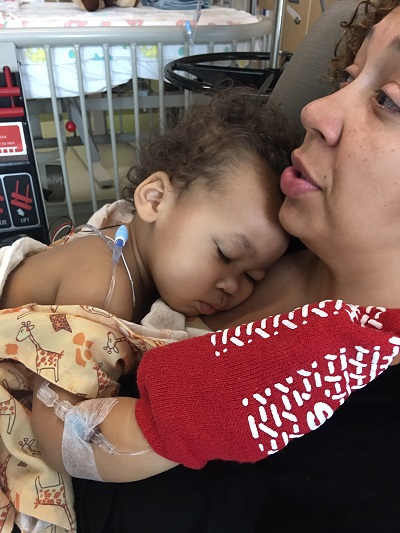 The darkest period of our story was after Isaac’s first stem cell transplant. His body had handled the previous treatments pretty well, but after the transplant he really started to look like the “cancer kids” you see on commercials. He’d lost his hair and a lot of weight. He was emaciated, and you could see the veins in his head through his skin.
The darkest period of our story was after Isaac’s first stem cell transplant. His body had handled the previous treatments pretty well, but after the transplant he really started to look like the “cancer kids” you see on commercials. He’d lost his hair and a lot of weight. He was emaciated, and you could see the veins in his head through his skin.
We were used to having this little kid with overflowing energy, but he became so weak he would hardly talk or move, and often fell asleep just sitting in his high chair.
He was a shell of himself. He looked like a kid who was going to pass away. It really, really hurt to see that.
Thankfully, Isaac recovered (with the help of many, many cups of milk!) and was able to continue his treatment, even finishing a few months earlier than we’d expected.
Back to the regularly-scheduled programming
If you met Isaac today, and didn’t know his story, you would never guess he had ever been so sick. He is a 52-pound brick; A super active 4-year-old who likes to wrestle with me and is learning to read. Once his treatment ended, he got right back to regularly-scheduled programming. He didn’t skip a beat!
I don’t ever think about cancer coming back for him, although I know it’s a possibility. If it does, we will do it all over again, knowing Seattle Children’s will be there for us.
Faith, family and Seattle Children’s
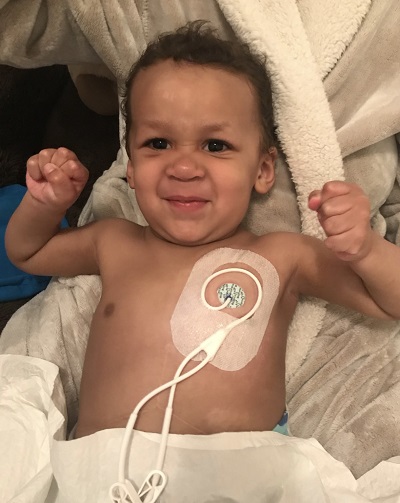
When I think about how I got through my son’s cancer treatment, I can identify three sources of strength — faith, family and Seattle Children’s.
First and foremost — Our steadfast faith in God and purpose. We prayed for Isaac every day and he had people all over the world praying for him. Through it all, we recognized that we were truly blessed.
Second, my family. My wife was incredible through everything.
Also, Isaac made it easier for us. He handled the treatment in a way that gave us all strength and made us believe everything was going to be okay.
He was an extremely easygoing patient. I was amazed at the level of maturity and calm he had. He handled everything so gracefully — blood draws, temperature checks, cleaning his central line, even having a feeding tube put in when his GI tract was scorched from chemotherapy. He just took it all like a champ.
Finally, I am so grateful for Seattle Children’s. Dr. Navin Pinto, Dr. Julie Park — I cannot thank them enough. They gave us tremendous confidence and walked us through this daunting journey.
Every nurse we had, the nursing assistants, the support staff — everyone at Seattle Children’s was so welcoming. Even today, when we go to the hospital to visit people, Isaac always wants to stay. He’s like, “Where’s my room?” He has such positive memories of this place. Without the amazing people working there, we’d have a totally different outlook.
They treated us like family, and I will never forget that. Without them, I don’t know how we would have gotten through this.
A message to other families of children with cancer
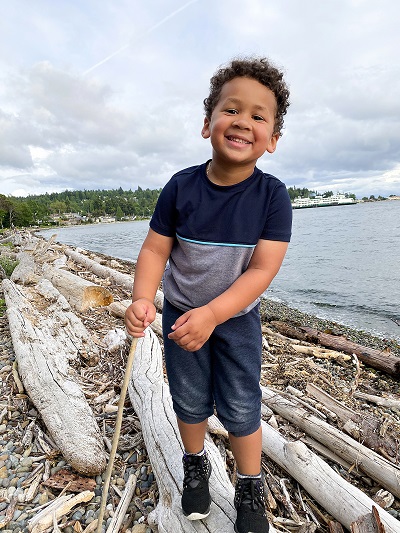 You may not know how your child is going to react to certain therapies or treatments or drugs, but you can trust that the people at Children’s care about your child and have your best interest at heart. Have faith that you are here for a reason. And you’ll get through it, because you have to. Because your child needs you. Because your kids are stronger than you’ll ever imagine. They’re amazing. And their bodies are resilient. So although you might be justifiably scared, know that you’re in the best place that you can be to get through this.
You may not know how your child is going to react to certain therapies or treatments or drugs, but you can trust that the people at Children’s care about your child and have your best interest at heart. Have faith that you are here for a reason. And you’ll get through it, because you have to. Because your child needs you. Because your kids are stronger than you’ll ever imagine. They’re amazing. And their bodies are resilient. So although you might be justifiably scared, know that you’re in the best place that you can be to get through this.
And you’re not alone.

